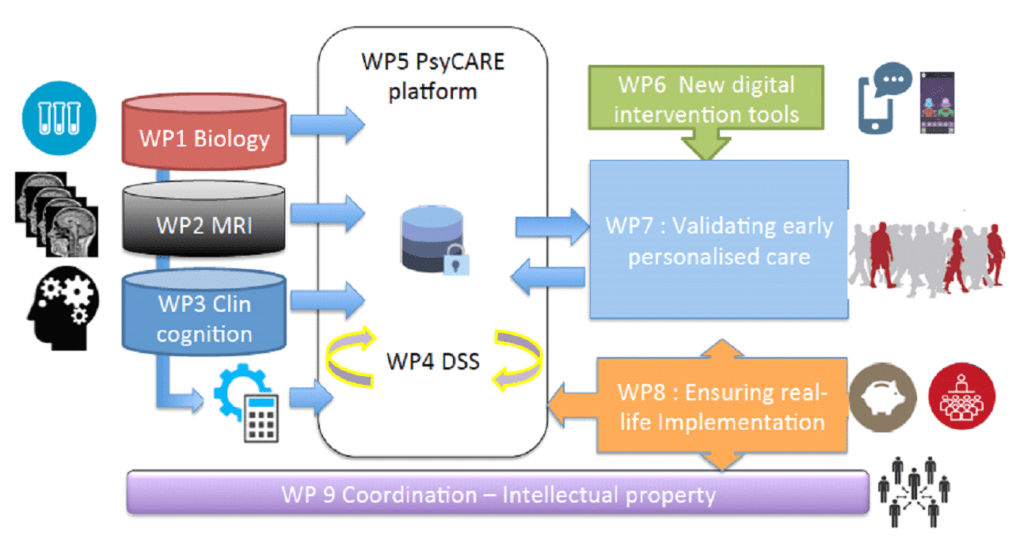The PsyCARE project is structured in 9 work packages(Workpackages – WP).

Workpackage1 : Identifying biomarkers to guide therapeutic interventions (Leaders: B. Chaumette and O. Kébir)
The main goal of WP1 is to identify genetic, epigenetic and metabolic characteristics in patients with early psychotic disorder. The data will enable the identification of biological subgroups and thus the stratification of the population to adapt the medical intervention implemented in WP7. In addition, the data will enable the identification of biomarkers in order to better state the stage of the disease, predict its evolution and the reaction to therapeutic strategies. The data will be used in the decision support system (DSS).
Workpackage 2 : Identifying imaging markers to guide therapeutic interventions (Leader: R. Jardri)
The main goal is to identify “signatures” that are specific to the evolutionary trajectories of patients by designing, validating and optimizing a machine learning algorithm based initially on structural MRI data from previous projects on psychosis. In parallel, standardized imaging protocols developed by the CATI network (link https://cati-neuroimaging.com/) will be implemented among clinical partners which are taking part in the PsyCARE clinical study.
Workpackage3 : Using novel digital tools for clinical and neurocognitive phenotyping (Leaders: J. Charlet and P. Lindberg)
The main goal of this workpackage is to provide tools for facilitating and enriching digital clinical phenotyping, with the perspective that this approach could be used by “front line” clinical staff (psychologists, psychiatrists, nurses, etc.). Various data (clinical records, surveys of patients and health professionals) will be collected; ontologies specific to the field of psychiatry and mental health will be created in order to enable the semantic processing of textual corpus; a tool for the evaluation of mild neurological signs and the use of linguistic markers in patients’ speech for the detection of schizophrenia will be developed. The second goal of the WP is the improvement of clinical models with all patient data (e.g., imaging, genomics, etc.), to provide the complete data model – the ontology – of the integration platform (WP5).
Workpackage4 : Multimodal data analysis (Leader: E. Duchesnay)
The main goal of WP4 is to design tools to predict clinical outcome. Models using statistics and machine learning will integrate multimodal data (clinical, neurocognitive, biological, MRI and genetic data) from the first workpackages (1 to 3) and the PsyCARE clinical studies, to create and optimize a decision support system (DSS).
Workpackage5 : Design and implementation of the PsyCARE platform (Leader: P. Boutinaud)
The main goal of WP5 is to ensure the efficient integration of all project data flows, to preserve their traceability, and to manage confidentiality and access to project data. Then the platform will have to stay in operational conditions and to develop it to satisfy the inevitable requirements changes throughout the duration of the project.
Workpackage6 : PsyCARE digital intervention tools for better cognition and promotion of engagement (Leader: E. Chevallier)
The WP6 aims at providing innovative and personalized digital tools in mental health. Pilot studies will be carried out to evaluate the efficiency, acceptability and user satisfaction of a cognitive training tool and of a monitoring tool to facilitate patient support and engagement (PsyCARE application).
Workpackage7 : Validating the effect of personalized treatment strategies on functional outcome in early psychosis (Leader: M.O. Krebs)
The main goal of WP7 is to evaluate the efficiency of a composite personalized care in patients with signs of early psychosis, including (A) the use of neuroprotective supplements adapted to the patient’s biological profile; (B) cognitive training or remediation programs; or (A+B) a combination of both. The composite personalized treatments are combined with Treatment As Usual (TAU), the only treatments received by the comparison arm. Efficiency will be evaluated throughout the trial on various dimensions: clinical, cognitive, biological, imaging, quality of life, care consumption, work resumption, and also the patient’s perception of his or her recovery.
Workpackage8 : Facilitating the wide-scale implementation of PsyCARE results (Leader: K. Chevreul)
The main goal of WP8 is to evaluate the relevance of PsyCARE results, as well as to facilitate their dissemination and to study their impact on society by developing a co-constructed participatory research. In this respect, it will ensure:
- Regarding patients and their relatives: the adaptation of PsyCARE results to the needs and expectations of this community. To this end, a participatory study including a large number of patients, caregivers and clinicians will be conducted;
- Regarding health professionals: the adoption of the results in professional practices;
- Regarding the health system: the socio-economic impact of the results and the associated benefits for all.
In particular, WP8 will consist in carrying out large-scale communication actions with health professionals specialized in mental health (dedicated workshops) and general practitioners (MOOC training on early detection and intervention). It is also planned to develop identification and referral tools for 1st and 2nd line professionals. Similarly, communication actions will be set up for the purpose of information, prevention and destigmatization of mental health for the general public.
Workpackage9 : Project coordination and dissemination of results (Leader: M.O. Krebs)
The main goal of WP9 is to ensure that the project achieves its scientific, technical and contractual goals, and that the results of the project are disseminated and exploited in a fair and optimal way, for the benefit of the patients first and of society, but also of research and French economy.